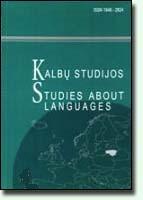Neologisms in the media coverage of the Russia-Ukraine war in the context of information warfare
Neologisms in the media coverage of the Russia-Ukraine war in the context of information warfare
Author(s): Natalie Kramar, Olga IlchenkoSubject(s): Media studies, Communication studies, Morphology, Lexis, Semantics, Russian Aggression against Ukraine, Russian war against Ukraine
Published by: Kauno Technologijos Universitetas
Keywords: Russia-Ukraine war; lexical neologism; semantic neologism; information warfare; media;
Summary/Abstract: The article delves into English neologisms associated with the Russia-Ukraine war, which gained significant media prominence from its onset on February 24, 2022, until the end of 2022. The following categories were identified: 1) lexical neologisms, which first appeared after the beginning of the war, e.g., sanctionista, Zelensky-washing, Putinflation, etc.; 2) semantic neologisms, which existed before the war but acquired new meanings due to it, e.g., deputinization, digital blockade, etc.; 3) re-actualized lexical units, which were sporadically used up to 2022 but gained renewed relevance and additional contextual valency in the context of the war, e.g., ruscism, stalinization, etc. Some of the neologisms under study were first coined in the Ukrainian or Russian languages and subsequently spread to other languages (e.g., missile terrorism), while others are limited to English only and have no equivalents in either Ukrainian or Russian (e.g., sanctionista). Focusing on the media coverage of the Russia-Ukraine war, we trace the etymology of the identified neologisms, their recurrence, and context of usage, as well as the pragmatic value they have in shaping public stances on the war in Western countries. We also take into consideration humorous neologisms that trended on social media during this period of the war, providing a way of releasing tension while also contributing to Ukrainian information warfare and fundraising purposes. The study is instrumental in driving our understanding of the role of linguistic creativity in the media framing of emotionally loaded and potentially divisive political issues.
Journal: Kalbų Studijos
- Issue Year: 2023
- Issue No: 43
- Page Range: 14-28
- Page Count: 15
- Language: English

